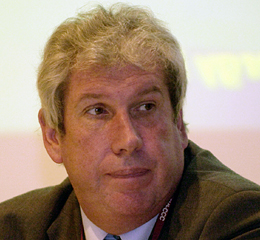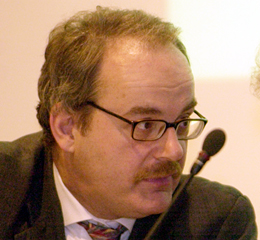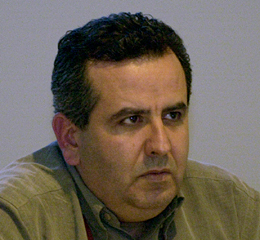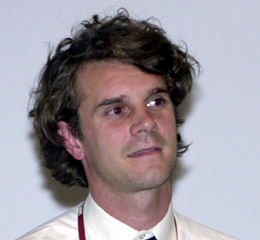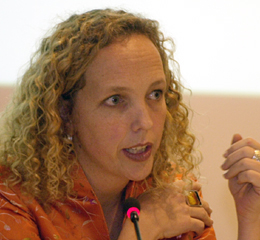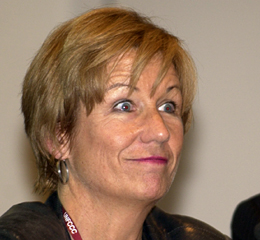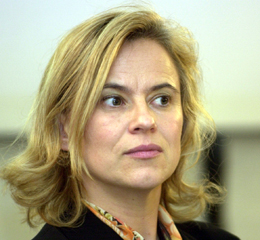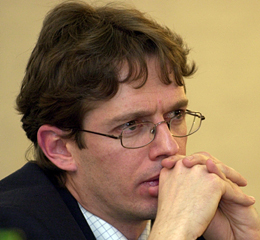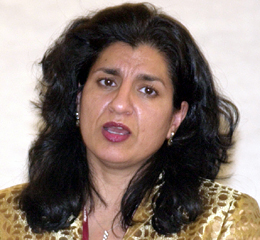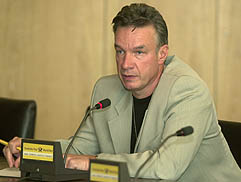|
|
|
|
|
|
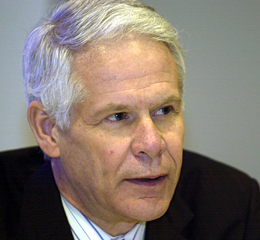 |
Advancing the international climate effort
Presented by the Pew Center on Global Climate Change, The Energy and Resources Insitute (TERI) and the Institute for International Sustainable Development and Relations (IDDRI)
Eileen Claussen, Pew Center on Global Climate Change, presented the Pew Center's report on "Beyond Kyoto: Advancing the international effort against climate change." Claussen noted that this report examines issues relating to equity, future mitigation commitments, mitigation costs, uncertainties, political economy and trade.
Dan Bodansky, University of Georgia, presented the broad themes of the Pew Center's report, and noted that political will is the key element for promoting a technology revolution that involves private and public sectors. He said that climate change is a collective challenge but countries will only engage in addressing the issue if they perceive national benefits. He suggested substituting emission targets with activity targets, including: cost-effective sequestration technology; gasoline replacement by hydrogen; and zero-net emissions from the energy sector.
Margaret Beckett, Secretary of State for Environment, Food and Rural Affairs of the UK, addressed the report's theme relating to the need for international approaches to undertake a technological revolution. Beckett said that each government will need to set targets and priorities to effectively address climate change-related issues. She highlighted the need for exchanging information on technological issues.
Patrick Atkins, ALCOA, noted the slow pace of market-driven technological development and applications, and stressed that they are inadequate to effectively mitigate greenhouse gas emissions.
David Kemp, Minister of the Environment of Australia, stressed the importance of assisting countries to reduce emissions, and noted that, at the moment, the Kyoto Protocol approach does not include the biggest greenhouse gas emitters.
Bill Hare, Greenpeace International, emphasized that a global framework in which all countries make commitments for mitigating greenhouse gas emissions is absolutely essential for addressing climate change. Hare highlighted the importance of developing country participation and addressing adaptation issues. He expressed hope that a future US administration would take environmental issues seriously, and would ratify the Kyoto Protocol.
Ambassador Raśl Estrada, Argentina, addressed the report's theme relating to the workability of emission targets, and noted that the Kyoto Protocol is the beginning of the mitigation exercise to limit developed countries' emissions. He said a new approach must be found for developing countries that would allow their continued economic development.
Charles Nicholson, British Petroleum, said the Kyoto Protocol faces a difficult phase and highlighted the need to understand the relationship between energy, technology and emissions. He underscored the importance of cooperation between private and public sectors to promote renewable, hydrogen and sequestration technologies.
Chandrashekhar Dasgupta, TERI, addressed the need for increasing flexibility to better accommodate national interests and the need to ensure adequate international efforts to mitigate greenhouse gas emissions. He advocated the establishment of two types of commitments for developed countries, involving emissions and financial contributions targets. Dasgupta noted that developing country participation depends on the flow of financial and technological resources from developed countries.
Laurence Tubiana, IDDRI, said that the Kyoto Protocol provides flexibility for developed countries, and underscored the need for more flexibility for developing countries, including the possibility of different types of commitments and a parallel system involving both emission targets and sustainable development targets.
|
|
|
Patrick Atkins, ALCOA, notes that international cooperation and political will are necessary to accelerate mitigation activities.
|
|
|
|
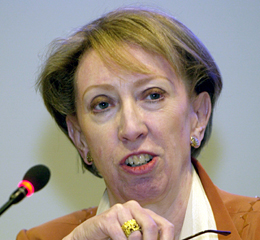 |
|
|
Margaret Beckett, Secretary of State for Environment, Food and Rural Affairs of the UK, underscores that more international cooperation is needed for mitigating
emissions.
|
|
|
|
|
|
|
|
|
|
|



